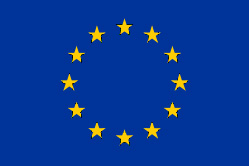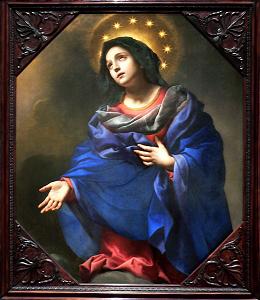European Union Flag
European Union Flag
Q: Is there a Marian interpretation of the symbolism on the European Flag?
A: The Flag of Europe consists of a circle of twelve golden stars on a blue background. It was created in 1955 and adopted by the European Union, then the European Economic Community, in 1984.
 The Flag of Europe
The Flag of Europe
Symbolism
Five-pointed stars represent aspiration and education. Gold is the color of the sun, and symbolizes glory and enlightenment. Blue, the color of the sky, symbolizes truth, and the intellect. It is also the color representing the Virgin Mary. The choice of twelve stars on the flag has no political connotations; rather the number will indicate perfection and completeness because of the ubiquity of the number for groups in European cultures and traditions, such as:
12 hours on a clock
12 months in a year
12 symbols of the zodiac
12 Apostles
12 sons of Jacob
12 semitones in an octave (western music)
12 days of Christmas
12 Caesars chronicled by Suetonius
12 Olympian gods
12 labors of Hercules
12 tables of Roman Law
12 Hues in the color wheel, star or sphere (western art)
Biblical Interpretation
Arranged in a circlet, a dozen stars represent the constellation of Corona and are seen as a crown in paintings of the Virgin Mary as Stella Maris. The circle of twelve stars also signifies royalty and implicitly structures of government (as in a Round Table). The flag's designer, Arsène Heitz, has acknowledged that Revelation 12:1 inspired him. He stated that the idea for the stars came to him from the apparition of the Blessed Virgin Mary at Rue du Bac in Paris and the Miraculous Medal.
 Madonna in Glory
Madonna in Glory
by Carlo Dolci, c. 1670
It may also be significant that the signing of the treaty that established what was to become the European Union, took place on the Capitoline Hill on March 25, 1957, the solemnity of the Annunciation. Robert Schuman and Konrad Adenauer, two of the founders of the European Union, were devout Catholics, so the significance of the incarnation of a new union of European countries on the same day as the incarnation of God's Word would not have been lost on them.
The design of the flag may also have been influenced by Paul M. Levy, a Belgian of Jewish descent. During World War II he made a pledge that if he should survive the war, he would convert to Christianity. Faithful to his pledge, Levy became a Catholic after the war. On May 5, 1949 when the Council of Europe was established in London Paul Levy became Chief of its Department of Culture. However, he has stated that he was informed of the connection to the Book of Revelation only after the symbolism of the flag was chosen
All About Mary includes a variety of content, much of which reflects the expertise, interpretations and opinions of the individual authors and not necessarily of the Marian Library or the University of Dayton. Please share feedback or suggestions with marianlibrary@udayton.edu.
